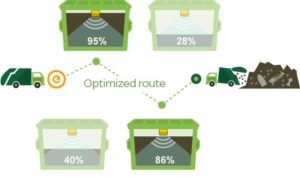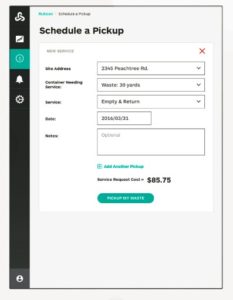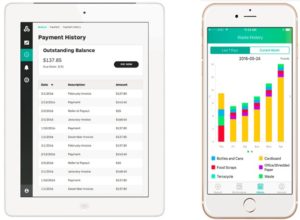Talking Trash

Rubicon Global has been hailed as the "Uber of Trash"
Much like how Uber matches drivers and passengers, Rubicon’s mobile and web-based platform matches 5,000 independent waste haulers with businesses that want to dispose of industrial trash, and recommends pick up routes based on location and waste-type [1].
The $65 billion U.S. waste and recycling market has historically been slow to leverage technology. Although the activity of waste collection is highly localized, the market is dominated by national behemoths Waste Management and Republic Services, and the rest of the market is highly fragmented among small independent haulers who many only own five to ten trucks, and service a 20 to 30-mile radius [2]. By introducing technology to create an online marketplace, Rubicon’s has built out a network of haulers that can service all markets individually, creating greater efficiency and competition in the system, driving down costs for customers and increasing access to jobs for suppliers [3].
Value to Businesses
Rubicon estimates that it can deliver 20-30% in cost savings for waste disposal. Historically, a company like Home Depot would use one disposal company across all its locations. With Rubicon’s network, national chains can now disaggregate the jobs for each location, allowing each to choose from a wider pool of vendors. With a few swipes on a tablet/phone, the business schedules a pick-up on-demand. Vendors then offer increasing low cost bids for a specific job until Rubicon chooses a vendor that meets the job complexity and speed requirements at the best price [4]. The increased competition lowers the cost of the job.
In addition, sending waste to be recycled / reused is cheaper than sending it to a landfill. Rubicon consults businesses on how to maximize their recycling streams, by tapping into its extensive recycling vendor network to find new uses for waste. In one example, it helped a large retailer turn its trash bill into a revenue-generator, by reselling the cardboard boxes that merchandise arrived in to a paper mill [5]. This work has the broader societal benefit of improving sustainability in the manufacturing process by increasing the proportion of end-of-life materials that are repurposed.
Another piece of Rubicon’s value proposition is in providing data analytics. Within the app, Rubicon organizes the invoices and recycling rebates in each transaction on a user-friendly interface, allowing businesses to visually track the details on all-in waste and recycling costs [6].
Value to Haulers
Rubicon’s software enhances a lot of logistical challenges for smaller independent waste vendors. It helps haulers build optimized routes and increase utilization of their truck fleet in real time. For example, rather than running several half-filled tracks, their scheduling system helps haulers rightsize the frequency of trips to maximize the percentage of full truck loads. Also, as all payments are handled electronically through the app, a paperless back office reduces costs and improves speed of payments [7].

The network effects of having such a large pool of haulers in turn attracts a wide base of customers – much like the Uber case, haulers are attracted to the platform because it gives them access to more customers, particularly the local accounts of national chains which they would not have been able to service previously due to limited scale. There are additional benefits to becoming a Rubicon member: Rubicon aggregates the buying power of all its independent haulers to help them buy supplies such as fuel, equipment and smartphones at a discounted price through industry discounts and strategic partnership [8]. It also offers flexible lines of credit / term loans from $500,000 to $5M to help haulers grow their businesses [9].
Next Steps
The company tripled its revenue in the last year [10], and has over ~$100M from venture capitalists (including Leo DiCaprio and former Uber executives) to scale the business [11]. It currently generates revenue from taking a cut of each pickup depending on the size of the pickup and the trash composition, as well as a portion of any incremental savings it brings to businesses by redirecting more waste towards recycling [11]. I believe Rubicon should make use of new developments in “Internet of Things” to drive additional cost efficiencies, such as automating more of the trash sorting and pickup operations. For example, a Finnish company called Enevo has been fitting dumpsters with sensors to detect when the bin is full and sending out messages for pickup [12]. The more Rubicon can find new ways to save businesses and haulers more money in their waste disposal process, the more Rubicon can attract new users and become a more valuable network.

Word Count (759)
[1] [8] Mallory Szczepanski, “Nate Morris of Rubicon Global Uses Technology to Transform the Waste and Recycling Industry”, Waste Age, September 9, 2016
[2] [11] Urvaksh Karkaria, “Uber for recycling’ Rubicon Global raising $50 million”, Atlanta Business Chronicle, August 31 2016
[3] [4] [8] Mike McCullough, “The eBay of waste: Rubicon helps corporations cut costs, trash”, Greenbiz, September 20, 2016
[5] [10] [12] Matt McFarland, “Smelly dumpsters are tech’s new frontier”, CNN Wire, November 16, 2016
[6] [7] Company Website
[9] “Rubicon Global Announces Innovative Financing Program for Its Hauler Network Through Partnership with The Credit Junction”, The Jerusalem Post, September 8, 2016
[11] Issie Lapowsky, “A Startup Just Got $30 Million to Shake Up the Garbage Industry”, Wired, January 13, 2015
Picture Credits: Rubicon Global, The Simpsons, Enevo





This is a very inspiring article. It is great to see people successfully using technology to tackle environmental issues while making business sense. I think the biggest advantage of having this system is the transparency of the information to everybody using the app across the supply chain. Having a real time map like this will make people optimize their locations, product mix, and configurations to best optimize their waste management in the long term. Having a more streamlined supply chain will also benefit Rubicon as more customers will find it beneficial to manage their waste and be more incentivized to use the app.
I had never heard of Rubicon before, but I absolutely love what they are doing and think that it is a very ingenious idea. The core of their business model also reminds me of that of Li & Fung’s – by aggregating the buying power of all of their haulers, they are able to get cheaper supplies from their suppliers, which in turn incentivizes more haulers and more companies to utilize their platform.
I wonder how national giants like Waste Management and Republic Services will react to Rubicon – because of their scale, I would not be surprised if they decided to undercut Rubicon in price (and still stay profitable). Besides driving cost savings, Rubicon will potentially need to find additional revenue streams (in addition to just taking a cut of each pickup) in order to stay profitable in the long-term.
Wow! This is another great example of how technology can be used to cut costs and tap into the shared economy. By making the service request cost so upfront and dynamic, I wonder if they also incite businesses to become more efficient with how they order trash pickup. For example, a business may chose to be part of a “trash pool,” where common pick-up happens on a given day of the week.
Looking at Rubicon’s next steps, do you think they are taking the right ones? Is improving cost enough? I would investigate the value of expanding their customer base from businesses to apartment buildings and home owners. Also, after visiting their website, I was disappointed to see they are unable to service my former employer’s address in Sweden. They should seriously consider working on Europe before Rocket Internet takes their business. It’s such a great opportunity!
This is such an interesting concept of providing independent waste haulers with the opportunity to get into the waste value chain. To help keep Rubicon sustainable as its national competitors (Waste Management and Republic Services) react and look to provide additional advantages to attract more customers, it may be helpful for Rubicon to consider establishing an entire digital ecosystem to maintain its digital advantage. Given its strength in data collection and analytics, Rubicon could consider 1) leveraging the digital space to provide new “add-ons” to help businesses save money (such as your mention of what Enevo is doing) and 2) utilizing its data analytics to provide its customers with more value-added information. For example, Rubicon recently partnered up with a data company to help customers track and calculate GHG emissions from their waste, helping them to better understand how to further save on emissions (http://www.environmentalleader.com/2016/09/08/rubicon-partnership-provides-flexible-financing-for-waste-haulers/#ixzz4QZKcO49p). The company’s strength in its information and analytics could serve as a strong competitive advantage against the national giants as the waste management landscape becomes more competitive.
This is a great post, and so interesting! It is truly mind-boggling that the waste removal landscape has been dominated by only two players for as long as it has, and that there has been so little innovation in the space especially given increasing focus on sustainability. It sounds like Rubicon is doing great work and has the potential to be a true game-changer; that it provides a compelling alternative to Waste Management and Republic Services might also help those two companies clean up their act and develop their own innovative solutions to sustainable and low cost waste management. The idea of installing sensors in waste bins is a fantastic one and, after an initial investment in this type of technology, would likely help Rubicon reduce costs further in the long term. Perhaps there are other ways, too, that Rubicon could harness technology to further move the needle.
This was a fascinating article with many parallels to Uber. One of Uber’s biggest strengths, in my opinion, is its ability to attract drivers to its network, in some cases, even poaching drivers from traditional cab companies. Right now, it seems like Rubicon hopes to organically grow its network by offering benefits such as discounts on fuel or optimized driving routes to independent waste haulers. I think they could grow even more quickly by pulling an aggressive, “Uber-like” play and trying to poach haulers from the traditional waste management companies. They may want to invest heavily in a “hauler recruiting division” to accelerate their network effects and business proposition.
I don’t think it’s necessarily realistic to try to poach haulers from the big players in this market. With Uber, all you really need is a car to get going, and many of the drivers who leave cab companies for Uber have their own cars anyway. In contrast, I would be shocked if the haulers for WM and Republic already own garbage (or recycling) vehicles. Doing a quick Google search, the prices I’m seeing for $100k+ prices for those trucks, even used. On top of that, I’m sure independent haulers would need to pay for the rights to dump non-recyclable garbage somewhere. Even with the generous credit terms they’re offering independent haulers to grow their businesses, it might be tough to convince WM/Republic haulers to become independent haulers. (I also feel like the Company might almost be able to create the biggest impact by partnering with the big players to help them challenge how they operate.)
Fascinating article! Another example of how technology is solving problems and creating efficiencies in society. Rubicon seems to provide real, tangible benefits for both haulers and companies; I found it incredible that the company was able to provide 20-30% cost to businesses who used the service. It’d be interesting to see how the margins for Rubicon compare to its competitors to know if/how they would be able to undercut Rubicon on price in order to maintain their historic market dominance. It’d also be interesting to see whether Rubicon would ever consider partnering with these companies to improve and implement future best practices, making the entire waste management market more efficient overall.
First of all, I love the Simpsons-inspired title image (“the garbage man caaaann!”). I’ve never even considered that there are independent haulers in the waste management realm–I always assumed these services were provided by local governments and never thought further. This is such a cool business; I especially like their initiative to help businesses turn waste into potential revenue streams (and recycling material that would otherwise end up in a landfill!). Helping haulers with enhancing capacity utilization and offering loans is also such a cool idea! I hope that they can continue helping encourage mindful recycling and discouraging dumping waste. I wonder what incentives there are on the haulers’ side to conduct more eco-conscious practices to reduce emissions from their vehicles, or if venturing down that road would ultimately send haulers elsewhere to look for cost savings. Cool article!
Thanks for the interesting read! It is a great example of an innovative company attempting to disrupt a static industry with large, powerful incumbents. Knowing that the large incumbents have a financial incentive to pick up trash and fill their own landfills for profit, Rubicon should expect to face a great deal of pushback as its grows. I would be interested to see if (and how) the company is attempting to forge relationships with local governments. The company will want to explain how its business is benefitting both local businesses and the local environment. Forming these relationships now may help to protect the company against competitor-spurred regulation in the future.
Bravo!
Wow, very cool! Talk about an industry in need of a technological update! One of the takeaways that these posts have highlighted is the need to focus on industries that have been operating in the status quo for a long time. It is easy at business school to focus on “sexy” or “techy” industries, but there has not been enough attention paid to industries such as this one. One problem that TOM217 brings up is that these industries often have entrenched incumbents or stakeholders that may be especially resistant to change. On the one hand, this makes disrupting these industries more challanging. However, the ability to think creatively about overlooked industries will give entrepreneurs a leg up on competition.